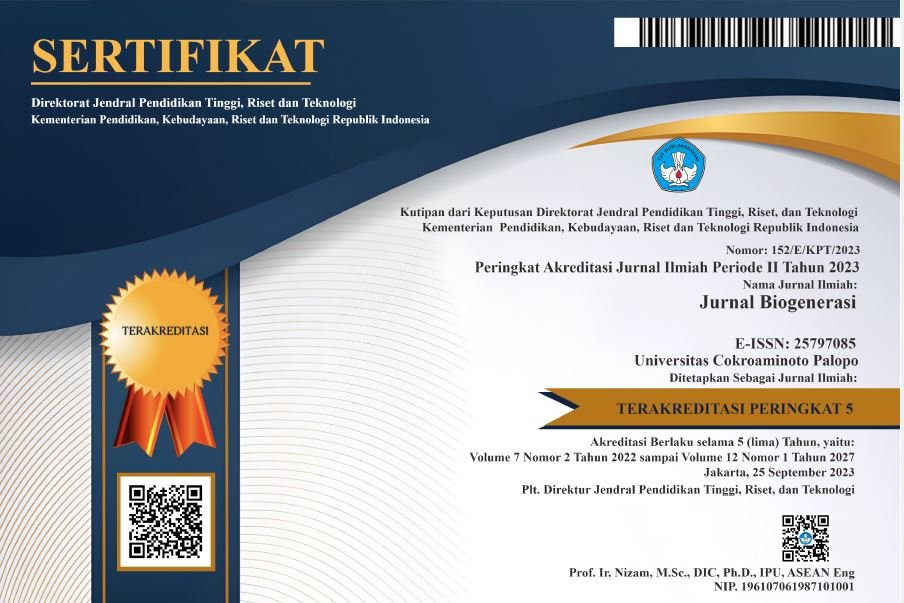ANALISIS PERSEPSI TENTANG KETERAMPILAN KOLABORATIF PESERTA DIDIK TERHADAP PEMBELAJARAN BIOLOGI DI SMA NEGERI 1 PADANG
DOI:
https://doi.org/10.30605/biogenerasi.v10i2.5480Keywords:
Collaboration Skills, Biology Learning, Student Perceptions, Conflict Resolution, Project ManagementAbstract
This research aims to analyze students' perceptions of collaboration skills regarding biology learning at SMA Negeri 1 Padang. The research was carried out using quantitative descriptive methods. The research population is students with a sample of 213 students selected using total sampling techniques. Data collection was carried out through questionnaires and direct observation, with research instruments that have been validated and show high reliability (Cronbach's Alpha = 0.85). The research results show that students' collaboration skills are in the very good category with an average percentage of 81.04%. Analysis of five indicators of collaboration skills produced the following findings: (1) conflict resolution obtained the highest percentage of 82.12%, indicating excellent ability in managing differences of opinion; (2) project management reached 81.69%, indicating excellent ability in organizing learning tasks; (3) tolerance reached 81.43%, reflecting excellent mutual respect; (4) group interaction of 80.53%, indicating good communication skills; and (5) contribution to the team was 79.44%, indicating a good willingness to contribute to achieving common goals. This research concludes that biology learning has succeeded in facilitating the development of students' collaboration skills. The implications of this research are the need to optimize learning strategies that can further increase the contribution of students in teams, as well as the importance of maintaining achievements in other indicators through a variety of appropriate learning activities.
Downloads
References
Dewi, M. R., & Utami, S. (2020). Analisis Keterampilan Kolaboratif Siswa Daring. Jurnal Pendidikan Biologi, 12(2), 45-57.
Greenstein, L. (2018). Assessing 21st Century Skills. Corwin Press.
Hasanah, M., & Surya, E. (2023). Efektivitas Pembelajaran Kolaboratif dalam Meningkatkan Pemahaman Konsep Biologi Siswa SMA. Jurnal Pendidikan Sains, 9(1), 34-45.
Hermawan, A. (2021). Implementasi Pembelajaran Kolaboratif Biologi. Jurnal Pendidikan Sains, 9(1), 12-25.
Kusuma, A. (2023). Implementasi Manajemen Proyek dalam Pembelajaran Biologi Kolaboratif. Jurnal Pendidikan Sains, 11(2), 89-104.
Nugroho, B. (2023). Efektivitas Interaksi Kelompok dalam Pembelajaran Biologi. Jurnal Penelitian Pendidikan, 14(1), 45-60.
Nurmalasari, R., & Wulandari, D. (2022). Analisis Kendala Implementasi Pembelajaran Kolaboratif pada Mata Pelajaran Biologi di SMA. Jurnal Pendidikan dan Pembelajaran, 5(2), 112-123.
Pramono, H. (2023). Strategi Resolusi Konflik dalam Pembelajaran Kolaboratif. Jurnal Manajemen Pendidikan, 12(4), 178-193.
Prasetyo, A., Sutrisno, B., & Wibowo, C. (2022). Analisis tantangan implementasi Kurikulum Merdeka dalam pembelajaran Biologi. Jurnal Pendidikan Biologi Indonesia, 8(2), 145-160.
Prasetyo, R., & Wulandari, S. (2023). Hubungan antara persepsi keterampilan kolaborasi dan motivasi belajar biologi. Jurnal Pendidikan dan Pembelajaran, 5(2), 89-104.
Pratiwi, I. (2019). Efek PISA terhadap Kurikulum Indonesia. Jurnal Pendidikan, 4(1), 51-71.
Pratiwi, S. N., & Mustika, R. (2023). Pengaruh Model Pembelajaran Kolaboratif terhadap Keterampilan Berpikir Kritis Siswa dalam Pembelajaran Biologi. Jurnal Penelitian Pendidikan, 10(1), 78-89.
Putri, R. M. (2021). Analisis Keterampilan Kolaboratif Biologi. Jurnal Penelitian Pendidikan IPA, 7(2), 167-178.
Samuelsson, M., & Samuelsson, J. (2016). Gender Differences in Boys’ and Girls’ Perception of Teaching and Learning Mathematics. Open Review of Educational Research, 3(1), 18–34.
Santoso, D. (2023). Penerapan Manajemen Proyek dalam Pembelajaran Berbasis Penyelidikan. Jurnal Inovasi Pembelajaran, 15(1), 90-105.
Susanto, H. (2023). Peran Guru dalam Fasilitasi Resolusi Konflik. Jurnal Pedagogik, 13(4), 145-160.
Supriyadi, A., & Rahman, F. (2022). Pengembangan Model Pembelajaran Kolaboratif Berbasis Proyek dalam Pembelajaran Biologi SMA. Jurnal Inovasi Pembelajaran, 8(3), 167-178.
Widodo, S., & Kartikasari, K. (2020). Implementasi Pembelajaran Kolaboratif dalam Meningkatkan Keterampilan Sosial Siswa SMA. Jurnal Pendidikan Biologi, 8(2), 112-123.
Widodo, S. (2021). Hubungan antara Persepsi dan Kemampuan Kolaborasi Siswa SMA. Jurnal Psikologi Pendidikan, 12(4), 145-158.
Wijaya, R. (2023). Pengembangan Sikap Toleran dalam Pembelajaran Sains. Jurnal Pendidikan Karakter, 11(1), 56-71.
Zubaidah, S. (2018). 4C: Learning Skills Revolusi Industri 4.0. Conference Paper, Universitas Negeri Malang.
Downloads
Published
How to Cite
Issue
Section
License
In submitting the manuscript to the journal, the authors certify that:
- They are authorized by their co-authors to enter into these arrangements.
- The work described has not been formally published before, except in the form of an abstract or as part of a published lecture, review, thesis, or overlay journal.
- That it is not under consideration for publication elsewhere,
- That its publication has been approved by all the author(s) and by the responsible authorities – tacitly or explicitly – of the institutes where the work has been carried out.
- They secure the right to reproduce any material that has already been published or copyrighted elsewhere.
- They agree to the following license and copyright agreement.
License and Copyright Agreement
Authors who publish with this journal agree to the following terms:
- Authors retain copyright and grant the journal right of first publication with the work simultaneously licensed under Creative Commons Attribution License (CC BY 4.0) that allows others to share the work with an acknowledgment of the work's authorship and initial publication in this journal.
- Authors are able to enter into separate, additional contractual arrangements for the non-exclusive distribution of the journal's published version of the work (e.g., post it to an institutional repository or publish it in a book), with an acknowledgment of its initial publication in this journal.
- Authors are permitted and encouraged to post their work online (e.g., in institutional repositories or on their website) prior to and during the submission process, as it can lead to productive exchanges, as well as earlier and greater citation of published work.


.png)

